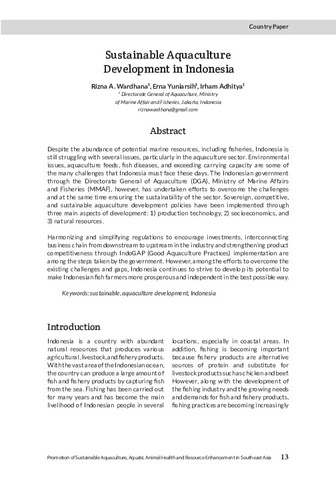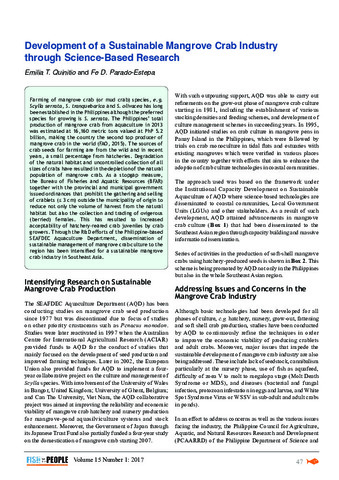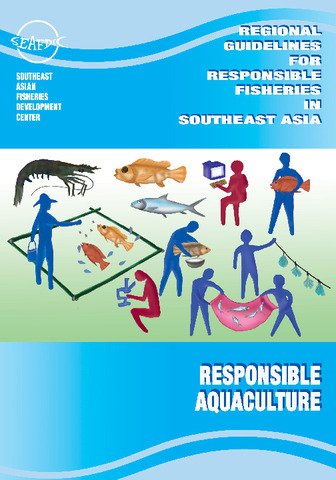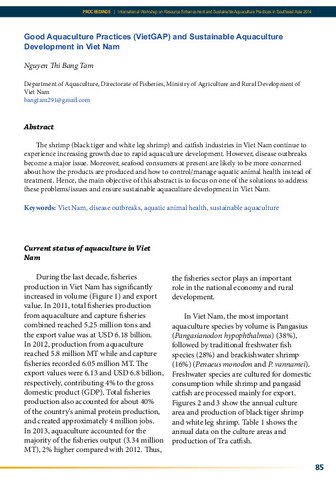Sustainable aquaculture development in Indonesia
| dc.contributor.author | Wardhana, Rizna A. | |
| dc.contributor.author | Yuniarsih, Erna | |
| dc.contributor.author | Adhitya, Irham | |
| dc.contributor.editor | Aya, Frolan A. | |
| dc.contributor.editor | de la Peña, Leobert D. | |
| dc.contributor.editor | Salayo, Nerissa D. | |
| dc.contributor.editor | Tendencia, Eleonor | |
| dc.date.accessioned | 2021-12-16T01:05:59Z | |
| dc.date.available | 2021-12-16T01:05:59Z | |
| dc.date.issued | 2021-12 | |
| dc.identifier.citation | Wardhana, R. A., Yuniarsih, E., & Adhitya, I. (2021). Sustainable aquaculture development in Indonesia. In F. A. Aya, L. D. de la Peña, N. D. Salayo, & E. A. Tendencia (Eds.), Proceedings of the International Workshop on the Promotion of Sustainable Aquaculture, Aquatic Animal Health, and Resource Enhancement in Southeast Asia (pp. 13–24). | en |
| dc.identifier.isbn | 9789719931102 (Print) | |
| dc.identifier.isbn | 9789719931119 (PDF) | |
| dc.identifier.uri | http://hdl.handle.net/10862/6251 | |
| dc.description.abstract | Despite the abundance of potential marine resources, including fisheries, Indonesia is still struggling with several issues, particularly in the aquaculture sector. Environmental issues, aquaculture feeds, fish diseases, and exceeding carrying capacity are some of the many challenges that Indonesia must face these days. The Indonesian government through the Directorate General of Aquaculture (DGA), Ministry of Marine Affairs and Fisheries (MMAF), however, has undertaken efforts to overcome the challenges and at the same time ensuring the sustainability of the sector. Sovereign, competitive, and sustainable aquaculture development policies have been implemented through three main aspects of development: 1) production technology, 2) socioeconomics, and 3) natural resources. Harmonizing and simplifying regulations to encourage investments, interconnecting business chain from downstream to upstream in the industry and strengthening product competitiveness through IndoGAP (Good Aquaculture Practices) implementation are among the steps taken by the government. However, among the efforts to overcome the existing challenges and gaps, Indonesia continues to strive to develop its potential to make Indonesian fish farmers more prosperous and independent in the best possible way. | en |
| dc.language.iso | en | en |
| dc.publisher | Aquaculture Department, Southeast Asian Fisheries Development Center | en |
| dc.rights | Attribution-NonCommercial-ShareAlike 3.0 IGO | * |
| dc.rights.uri | http://creativecommons.org/licenses/by-nc-sa/3.0/igo/ | * |
| dc.subject | sustainable | en |
| dc.subject | Indonesia | en |
| dc.title | Sustainable aquaculture development in Indonesia | en |
| dc.type | Conference paper | en |
| dc.citation.spage | 13 | |
| dc.citation.epage | 24 | |
| dc.citation.conferenceTitle | Proceedings of the International Workshop on the Promotion of Sustainable Aquaculture, Aquatic Animal Health, and Resource Enhancement in Southeast Asia | en |
| dc.subject.asfa | aquaculture development | en |
| dc.subject.asfa | sustainability | en |
| dc.subject.asfa | sustainable aquaculture | en |
| dc.subject.asfa | aquaculture | en |
| dc.subject.asfa | aquaculture systems | en |
| dc.subject.asfa | aquaculture techniques | en |
| dc.subject.asfa | feeding | en |
Files in this item
รายการนี้ปรากฏใน (s)
-
Promotion of Sustainable Aquaculture, Aquatic Animal Health, and Resource Enhancement in Southeast Asia (SARSEA) [31]
Proceedings of the International Workshop on the Promotion of Sustainable Aquaculture, Aquatic Animal Health, and Resource Enhancement in Southeast Asia 25–27 June 2019, Iloilo City, Philippines







